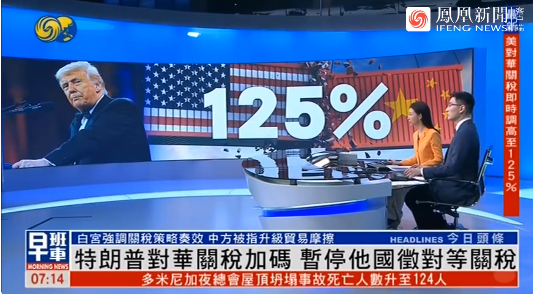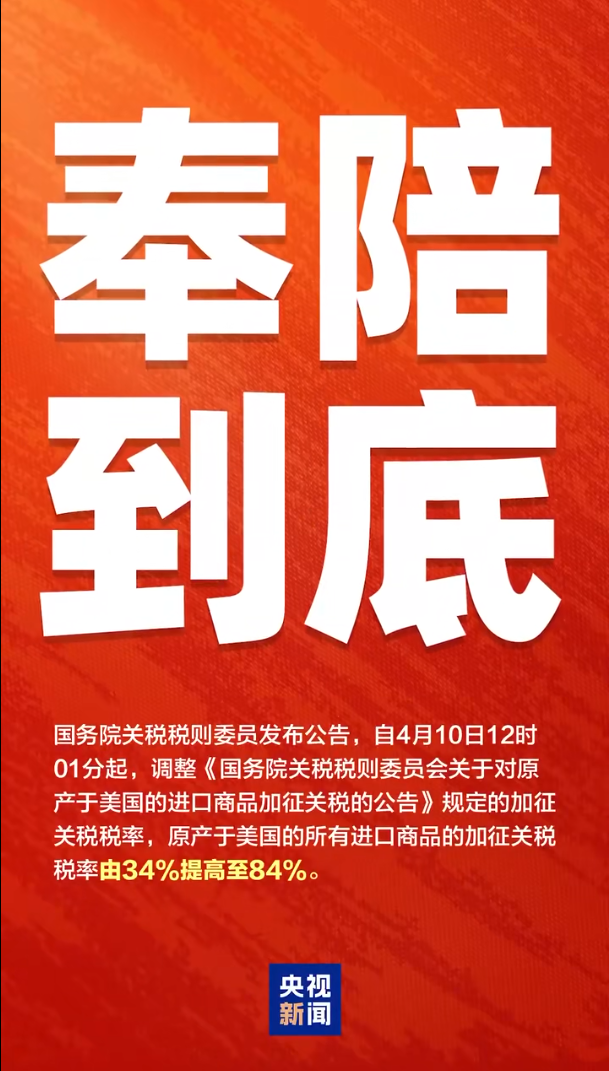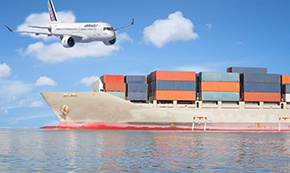All categories >
Trump announced that he will raise tariffs on China to 125%, and China will resolutely counter!
Categories:
News Center
News
Time of issue:
2025-04-10 15:10
Views:
Trump Announces Raising Tariffs on China to 125%: US-China Trade Relations Stalled Again
On April 9, 2025, US President Trump announced a major adjustment to trade policy on social media, significantly raising tariffs on imported goods from China to 125%. This move not only marks a further escalation of US-China trade friction but also has drawn widespread attention and concern from global markets.

Specific Content of Trump's Tariff Policy
• Tariff Adjustment on China: Trump announced raising tariffs on Chinese goods imported into the US from the previous 104% to 125%. This tariff adjustment took effect immediately, setting a new high in recent years of US-China trade friction.
• Tariff Policy on Other Countries: At the same time, Trump announced a 90-day tariff suspension policy for over 75 countries, which will enjoy a 10% reciprocal tariff reduction during this period. However, some countries, including Canada and Mexico, were not included.
Trump's Policy Logic
• Tough Stance on China: Trump claimed that raising tariffs was to end "China's unreasonable exploitation of the US and other countries" and accused China of "lacking respect for the world market".
• Election Politics: This tough measure is also seen as part of Trump's efforts to build a "tough on China" image for the 2024 election.
• Dividing International Economic and Trade Blocs: Through a strategy of "carrot and stick," Trump is attempting to divide international economic and trade blocs and win over some countries to support US trade policies.

China's Countermeasures
Tariff Rate Adjustment
According to the No. 5 Announcement of the State Council Tariff Commission in 2025, starting from 12:01 on April 10, 2025, China will increase the additional tariff rate on imported goods originating from the US from 34% to 84%. This measure reflects China's determination to resolutely safeguard its legitimate rights and interests.
Handling of Goods in Transit
The General Administration of Customs issued an announcement clarifying that for "goods in transit" that had been shipped from the place of departure before 12:01 on April 10, 2025, and imported between 12:01 on April 10, 2025 and 24:00 on May 13, 2025, importing enterprises can apply for exemption from the newly imposed tariffs. Importing enterprises need to verify the transportation situation of the goods themselves and submit relevant supporting documents when declaring imports.
Management of Customs Special Supervision Zones
Bonded imports of goods originating from the US in customs special supervision zones cannot be bonded for circulation from 12:01 on April 10, 2025, and must be declared for domestic sales according to all the corresponding bonded materials.
Escalation of US-China Trade Relations
The US's tariff escalation has led to further tensions in US-China trade relations. China has demonstrated its determination to protect its own interests through multi-dimensional countermeasures, including additional tariffs, rare earth controls, expansion of domestic demand, and supply chain restructuring. China has also filed a lawsuit with the WTO regarding the US's imposition of additional tariffs.
Global Market Fluctuations
The repeated adjustments to US tariff policies have caused sharp fluctuations in global markets. Although the US's partial tariff suspension measures led to a record single-day surge in the three major US stock indices, analysts warn that policy reversals are causing a market crisis of confidence, and long-term uncertainty remains.
Differing Attitudes Among Allies
Although the EU and Canada have received tariff relief, they still maintain countermeasures against the US. Russia criticized US policies as violating WTO rules, while Hungary affirmed China's investment policy of "non-interference in internal affairs".
• Uncertainty in Trade Negotiations: Trump's tariff policy adjustments have added new uncertainties to future US-China trade negotiations. Although the US claims that the 90-day tariff suspension period has created conditions for a new round of trade negotiations, it remains to be seen whether China will accept the US's negotiating terms.
• Challenges to the Global Economy: This tariff policy adjustment could further impact the global economy, exacerbate supply chain disruption risks, and pose new challenges to global economic growth.
Trump's tariff policy adjustment is a continuation of his "America First" strategy, but its potential impact on the global economy and US-China relations cannot be ignored. China has demonstrated its determination to protect its own interests through measures such as additional tariffs, multilateral cooperation, and supply chain restructuring. In the future, the development of US-China trade relations will depend on the outcome of negotiations between the two sides and the adaptability of the global economy.
Keywords:










